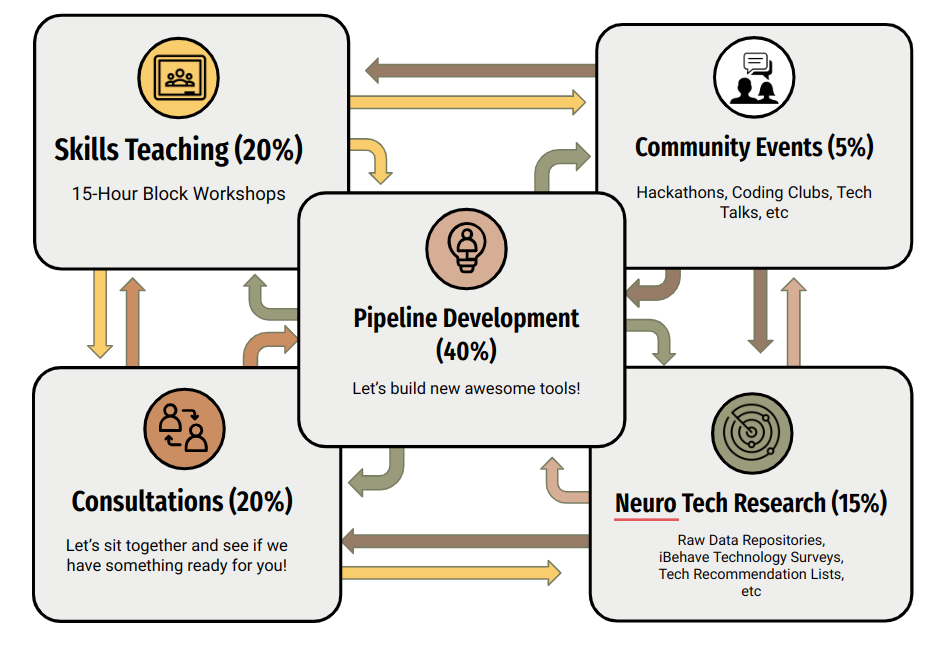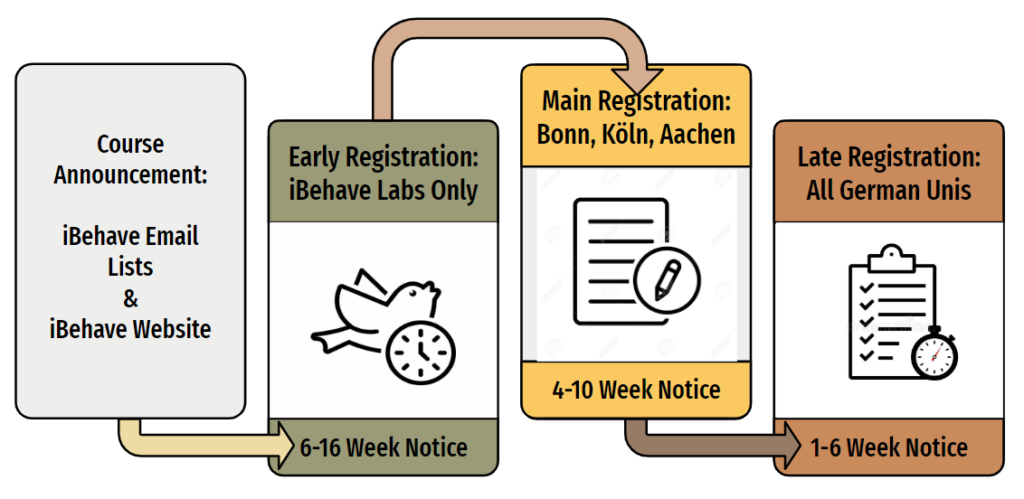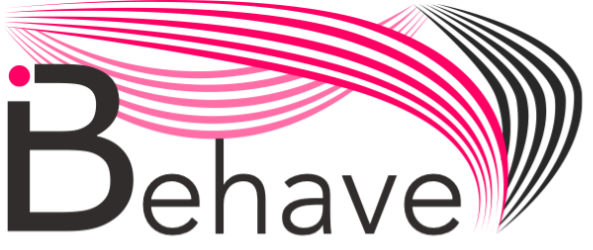iBOTS offers critical programming assistance to over 40 neuroscience labs across Bonn, Köln, Aachen, and Jülich in the iBehave network. Our mission is to enable data collection, processing, and analysis through swift training and knowledge dissemination. We focus on simplifying, automating, and disseminating data analysis pipelines using open-source software and programming environments.
Unlike conventional engineering groups, iBOTS is a training and consulting platform that links researchers to open-source technologies and free resources. We’re committed to bridging the gap between scientific goals and technical execution by promoting knowledge exchange, collaborative development, and community building. This results in close relationships with researchers, custom, cost-effective neuroscience tech solutions, and high direct availability to scientists at all levels of their academic careers.
Our Services

Online Data Analysis and Programming Workshops
Upcoming Workshops
- Intro to Neural Spike Analysis in Python: How do we extract, measure, and model spike trains from neuronal recordings? In this hands-on workshop, participants will explore electrophysiological data, both real and simulated, to investigate the firing patterns of single neurons and neural populations. Participants will learn visualization and descriptive techniques (raster plots, PSTHs, cross-correlograms) alongside Poisson-based generative models and coherence-based analyses using Python’s core scientific stack (NumPy, SciPy, Pandas) and neuroscience-specific Python libraries (Neo, Elephant). Participants will also learn how to extract single-unit activity from multichannel recordings using filtering, peak detection and PCA-based clustering with Scikit-Learn and SpikeInterface.
- When: June 11th-13th, 2025 @ 9:30–17:00
- Trainer: Dr. Ole Bialas
- Format: Hands-On Workshop (>50% Small-Group Exercises)
- Length: 18 Hours
- Location: Online (Zoom link will be provided upon registration)
- Registration: https://uni-bonn.zoom-x.de/meeting/register/cp5YQQMcRTGoZQQ-_GXxew
- Prerequisites:
- Familiar with Topics Covered in Essential Computer Tools for Researchers
- Familiar with Topics Covered in Intro to Python for Scientists
- Completely New to Python and Coding? Take all three courses in the same week as a 5-Day mega workshop!
- Topics:
- Electrophysiology-based Spike Extraction: Filtering, peak detection, and PCA-based clustering, with Scipy-Signal, Scikt-Learn and SpikeInterface
- Spike Train Metrics: Raster plots, PSTH, CV, cross-correlograms, and receptive field mapping, using Numpy, Matplotlib, and Panda
- Poisson-Based Statistical Modeling: Generative models and coherence analysis (UEA & SPADE), using Scipy-Stats and Elephant
- Intro to Python for Scientists: Python is one of the most widely used programming languages in academia and beyond. This one-day, hands-on course will teach how to use Python and manage scientific coding projects. Participants will learn how to organize and analyze data using the Numpy and Pandas Libraries, visualize data using Matplotlib and Seaborn and perform statistical tests using Pingouin. By analyzing real data from neuroscience and other disciplines, participants will acquire the confidence to use Python in their own projects. Assignments are organized in Jupyter Notebooks that participants will collaborate on and solve in small teams of 2–3 people, providing an environment where all can learn from each other’s experiences.
- When: July 10th, 2025 @ 9:30 – 17:00 CET
- Trainer: Dr. Sangeetha Nandakumar
- Format: Hands-On Workshop (>50% Small-Group Exercises)
- Length: 6 Hours
- Location: Online (Zoom link will be provided upon registration)
- Registration: https://uni-bonn.zoom-x.de/meeting/register/ySh7UK0uSqu7A96ZW2mCWQ
- Prerequisites:
- Familiar with Topics Covered in Essential Computer Tools for Researchers
- Completely New to Python? Just take both courses together as a two-day workshop!
- Topics:
- Python: Writing and Running Python code using Jupyter Notebooks
- Data Structures: Working with Tables and Arrays in Pandas and Numpy
- Visualization and Statistics: Plotting and Testing with Matplotlib, Seaborn and Pingouin
- Essential Computer Tools for Researchers: Computer tools can help scientists make their research more reproducible, facilitate collaboration with other researchers, and enhance their productivity. This one-day course provides an introduction to the essential tools for organizing and managing computational projects, as well as sharing code and data with other scientists. Participants will learn about writing and running code with Visual Studio Code and Jupyter Notebooks, managing Python environments with Conda, version control with Git and sharing code and data with GitHub and Sciebo. After this course, participants will be equipped with the tools to do professional computational research.
- When: July 6th, 2025 @ 9:30–17:00 CET
- Trainer: Dr. Sangeetha Nandakumar
- Format: Hands-On Workshop (>50% Small-Group Exercises)
- Length: 6 Hours
- Location: Online (Zoom link will be provided upon registration)
- Registration: https://uni-bonn.zoom-x.de/meeting/register/KT9geUptSFGCB3IhUVgjaw
- Prerequisites: None. Participants of all skill levels and backgrounds are welcome!
- Topics:
- Installing Scientific Software: Package Management and Project Sandboxing with Conda and Pip
- Working with Code: Editing and Running Code with the Terminal, the Visual Studio Code IDE and Jupyter Notebooks
- Managing Scientific Projects: Version Control and Backups with Git, GitHub, and Sciebo
Past Workshops
- Intro to Calcium Imaging Analysis in Python: How do I extract calcium traces from images, and how do I analyze them? In this workshop, we cover the essential concepts needed to answer these questions using Python tools like NumPy, SciPy, and Napari. We will explore how to convert continuous calcium traces into neural spikes through deconvolution, extract fluorescence estimates from Region(s) of Interest selected manually and automatically, and improve these estimates by removing contributions from the surrounding neuropil. Participants will work with real calcium imaging data to apply the above tools and methods.
- When: May 7th-9th, 2025 @ 9:30 – 17:00 CET
- Trainer: Dr. Sangeetha Nandakumar
- Format: Hands-On Workshop (>50% Small-Group Exercises)
- Length: 18 Hours
- Location: Online (Zoom link will be provided upon registration)
- Registration: https://uni-bonn.zoom-x.de/meeting/register/8ZYHSfWlRkWEHv1767DXPA
- Prerequisites:
- Familiar with Topics Covered in: Essential Computer Tools for Researchers
- Familiar with Topics Covered in: Intro to Python for Scientists
- Completely New to Python and Coding? Take all three courses in the same week as a 5-Day mega workshop!
- Topics:
- Calcium Traces to Spikes: Extracting flourescence estimates from images and converting them into spikes through NumPy and SciPy.
- Region(s) of Interest: Manual and automated method for selecting ROIs with Napari and scikit-image.
- Motion Correction: Correcting movement artifacts in recorded imaging data with scikit-image and suite2p.
- Intro to Python for Scientists: Python is one of the most widely used programming languages in academia and beyond. This one-day, hands-on course will teach how to use Python and manage scientific coding projects. Participants will learn how to organize and analyze data using the Numpy and Pandas Libraries, visualize data using Matplotlib and Seaborn and perform statistical tests using Pingouin. By analysing real data from neuroscience and other disciplines, participants will acquire the confidence to use Python in their own projects. Assignments are organized in Jupyter Notebooks that participants will collaborate on and solve in small teams of 2-3 people, providing an environment where all can learn from each other’s experiences.
- When: May 6th, 2025 @ 9:30 – 17:00 CET
- Trainer: Dr. Atle E. Rimehaug
- Format: Hands-On Workshop (>50% Small-Group Exercises)
- Length: 6 Hours
- Location: Online (Zoom link will be provided upon registration)
- Registration: https://uni-bonn.zoom-x.de/meeting/register/hrs4YpjkT0icMJtyuktEGg
- Prerequisites:
- Familiar with Topics Covered in: Essential Computer Tools for Researchers
- Completely New to Python? Just take both courses together as a two-day workshop!
- Topics:
- Python: Writing and Running Python code using Jupyter Notebooks
- Data Structures: Working with Tables and Arrays in Numpy and Pandas
- Visualization and Statistics: Plotting and Testing with Matplotlib, Seaborn and Pingouin
- Essential Computer Tools for Researchers: Computer tools can help scientists make their research more reproducible, facilitate collaboration with other researchers, and enhance their productivity. This one-day course provides an introduction to the essential tools for organizing and managing computational projects as well as sharing code and data with other scientists. Participants will learn how to use Visual Studio Code to develop software code, version control and project management with git and GitHub, sharing data and other parts of your project via Sciebo, and using the terminal together with package managers to create reproducible computational science environments.
- When: May 5th, 2025 @ 9:30 – 17:00 CET
- Trainer: Dr. Ole Bialas
- Format: Hands-On Workshop (>50% Small-Group Exercises)
- Length: 6 Hours
- Location: Online (Zoom link will be provided upon registration)
- Registration: https://uni-bonn.zoom-x.de/meeting/register/O6eMtEbUS5-uj6DfMBvRzg
- Prerequisites: None. Participants of all skill levels and backgrounds are welcome!
- Topics:
- Installing Scientific Software: Package Management and Project Sandboxing with Conda
- Working with Code: Editing and Running Code with the Terminal and the Visual Studio Code IDE
- Managing Scientific Projects: Version Control and Backups with Git, GitHub, and Sciebo
- Local Field Potential (LFP) Analysis in Python: What is the local field potential? What kind of neural activity does it reflect, and how do I analyze it? These and other questions will be answered in this hands-on workshop that covers the essential tools and methods for analyzing LFPs together with spike data in Python. Students will learn how methods like frequency analysis, current source density (CSD) analysis, and spike-field coherence provide insight into the neural activity underlying the recorded signals. Tools and methods will be applied to real-world, multi-area Neuropixels and behavioral data to learn how to go from collected data to uncovering a cross-area neural circuit using LFP and spike data.
- March 12th-14th, 2025
- 3-Day Online Course
- Instructor: Dr. Atle E. Rimehaug
- Prerequisites:
- Familiar with Topics Covered in: Essential Computer Tools for Researchers
- Familiar with Topics Covered in: Intro to Python for Scientists
- Topics
- Behavior to Electrophysiology: Associating Continuous Neural Signals to Behavior through Visualization with Matplotlib
- Frequency Analysis: Investigating and Filtering Oscillations in LFP and Spikes with Scipy-Signal
- Relating LFPs and Spikes: Current Source Density and Coherence Analyses with Elephant
- Building Robust Neuroscience Experiments with Python and PsychoPy: This three-day course focuses on building experimental applications with Python and PsychoPy that present stimuli, record responses and communicate with external devices. Going beyond mere scripting, we’ll create a modular software that is easy to understand, maintain and reuse. In hands-on exercises, we’ll learn how to create robust applications by leveraging modern software engineering tools like automated testing with PyTest, data validation with Pydantic, and continuous integration with GitHub Actions.
All researchers are welcome – this will cover advanced topics, but you don’t have to be a seasoned programmer or experimenter to get a lot out of the workshops!- Dec 11th – 13th, 2024
- 3-Day Online Course
- Instructor: Dr. Ole Bialas
- Research Software Development: Electrophysiological Data Processing and Packaging with Python, Nix, Neo, and DataLad: Want to better-organize, share, publish your neuroscience data analysis projects? Taught using the Python language, we will practice processing raw electrophysiological data from neuroscience experiments into ready-to-publish Nix files that can be used in data analysis using Neo. Covering the full tool stack of software development and research publication tools including git, GIN, Zenodo, and DataLad, this intensive hands-on course is intended for researchers with some previous data analysis experience in Python and a familiarity with electrophysiology.
- Sept 25-27, 2024
- 3-Day Online Course
- Instructors: Dr. Michael Denker, Dr. Nicholas A. Del Grosso, and Prof. Thomas Wachtler
- Note: Those interested in further training beyond this workshop are invited to apply for the follow-up ANDA-NI school taught this fall: https://andani.info
- Intro to Neuroscience Data Analysis with Python and Pandas: In this hands-on, introductory-level workshop, we will explore the use of Python and Pandas for data analysis in neuroscience and demonstrate their application to real experimental data. Short introductory lectures will be given for each topic, but most of the day participants will practice using Python on data themselves to get hands-on experience with the tools for data analysis, organization, and visualization. We will show how popular and widely used libraries, both in neuroscience and data science in general, like Numpy, XArray, Seaborn, Pingouin, and Matplotlib can help you go from collected data to final results.
- Oct 14th-18th, 2024
- 5-Day Online Course
- Instructor: Dr. Atle E. Rimehaug
- Register: https://uni-bonn.zoom-x.de/meeting/register/u5UucOqprj0uH9UwKbLfGMwHnpC4odBIPotT
- Notebook-Driven Development for Research Data Analysis With Papermill and PyDoIt: Data science Notebooks are a powerful tool that allows you to combine code, figures, and written explanations all in one place! Join us in this three-day, hands-on workshop, where we will extract the best out of data science notebooks by learning how to embed explanations, create beautiful plots using hvPlot, generate presentations from our analyses, and even advanced techniques that leverage PyDoIt and Papermill to build multi-notebook pipelines, run the analyses across varying parameters, batch process across mutiple datasets, and even develop fully-documented libraries of reusable code! This course is open to all researchers, with or without experience in a programming language.
- Oct 23-25, 2024
- 3-Day Online Course
- Instructor: Dr. Sangeetha Nandakumar
- Essential Computational Tools for Researchers: The Terminal, Git, and VSCode: Whether it be text, scientific data, scientific manuscripts, or software, researchers keep their files organized and shareable as part of applying Open Science principles to daily work. This hands-on workshop is designed to help all researchers learn how to use Git, VSCode, the terminal, and software package managers to keep their projects organized, shareable, backed up across computers, and even publishable in collaborative research environments.
- Nov 13-15th, 2024
- 3-Day Online Course
- Instructors: Dr. Nicholas A. Del Grosso and Dr. Malte Peterson
Open Registration to Neuroscientists in Germany

Our Mission: To Bring Modern Software and Data Engineering Practices into Neuroscience Research Groups through Team Collaboration

Our Team
Nicholas A.
Del Grosso
Sangeetha
Nandakumar
Atle
Rimehaug
Ole
Bialas





